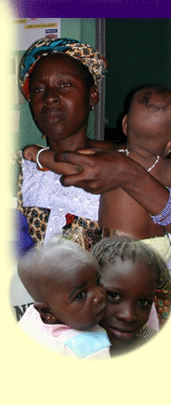
Postpartum hemorrhage is the leading cause of maternal mortality worldwide, resulting in about
130,000 deaths each year. In Benin, Ethiopia
and Mali, PRIME II implemented a USAID-funded special initiative
to prevent postpartum hemorrhage by training providers in active management of the third stage of
labor (AMTSL). Recommended by the World Health Organization as a best practice for all vaginal deliveries, AMTSL brings about
safer and faster delivery of the placenta through administration of oxytocic drugs within the first
minute after birth, controlled umbilical cord traction with counter-traction to the uterus, and
massage of the uterine fundus through the abdomen.
The special initiative was implemented at seven pilot sites in Benin, eight in Mali and 24 in
Ethiopia, with more than 300 providers—midwives, nurses and ob/gyns—trained in AMTSL and
related areas including birth preparedness and complication readiness counseling, infection
prevention and oxytocics storage. The pilot site facilities ranged from community health centers to
tertiary teaching hospitals. Collaborators in the initiative included ministries of health,
professional associations, and partners Management Sciences for Health/RPM+, the American College of
Nurse-Midwives and JHPIEGO. PRIME also worked at the national level in the three countries to
incorporate AMTSL into standards, protocols and pre-service training, emphasize the importance of
endorsing mid-level providers to administer oxytocics, and ensure sustainable supplies of
oxytocics.
By the end of the pilot project, AMTSL had been applied during 69% of the 23,197 vaginal births attended by PRIME-trained providers in the three countries, with very few complications reported. Qualitative data revealed a high level of provider satisfaction with the practice, and the AMTSL training guide, job aids and tools developed by PRIME are now used by ministries of health and professional associations in all three countries.
|











